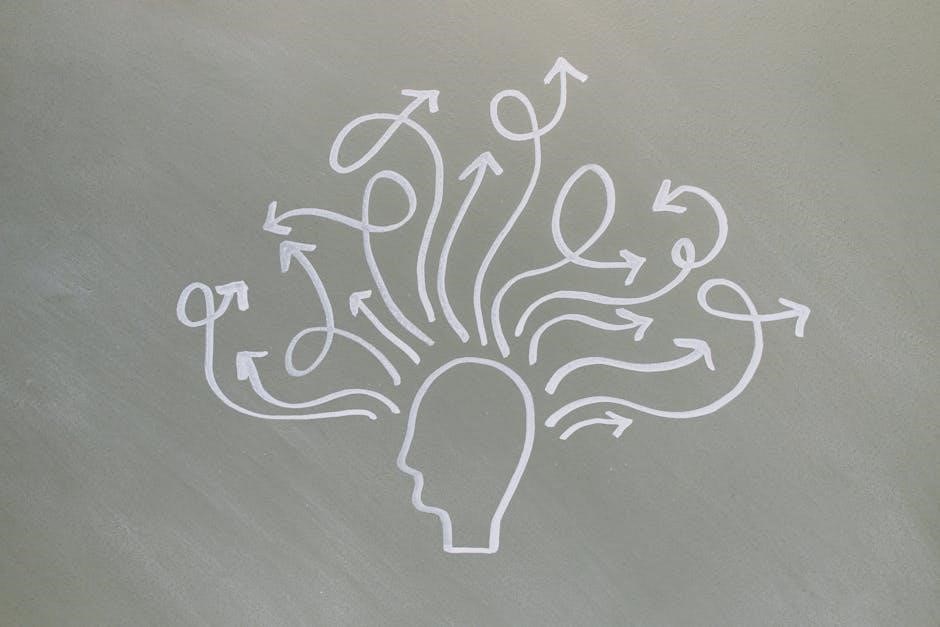
developmental psychology pdf
Developmental psychology examines human development across the lifespan, focusing on physical, cognitive, social, and emotional growth. It explores how individuals develop from infancy to old age, addressing real-world applications and societal impacts.
1.1 Definition and Scope of Developmental Psychology
Developmental psychology is the scientific study of human development across the lifespan, focusing on physical, cognitive, social, and emotional growth. It examines how individuals change and develop from infancy through old age, emphasizing the processes and mechanisms that underlie these changes. The field adopts a lifespan perspective, recognizing that development is a continuous process influenced by biological, psychological, and environmental factors. It draws on theories and methods from psychology, biology, sociology, and education to understand growth, adaptation, and aging.
1.2 Importance of Studying Developmental Psychology
Studying developmental psychology is crucial for understanding human growth and behavior across the lifespan. It provides insights into cognitive, social, and emotional development, enabling professionals to address challenges like learning disabilities, mental health issues, and societal inequalities. This field informs education, parenting, and policy-making, promoting healthier development and societal well-being. By understanding developmental processes, we can create supportive environments that foster resilience and adaptability, ultimately improving quality of life for individuals and communities across generations.

Theoretical Foundations of Developmental Psychology
Developmental psychology relies on key theories that explain human growth and behavior across the lifespan, providing frameworks for understanding cognitive, social, and emotional changes.
2.1 Major Theories in Developmental Psychology
Developmental psychology is guided by several major theories, including Piaget’s Cognitive-Developmental Theory, Vygotsky’s Sociocultural Theory, and Erikson’s Psychosocial Theory; These frameworks explain how individuals grow and change across the lifespan. Piaget focuses on stages of cognitive development, while Vygotsky emphasizes social interactions and culture. Erikson’s theory highlights psychosocial stages and identity formation. Additionally, theories like Kohlberg’s Moral Development and Bowlby’s Attachment Theory provide insights into specific aspects of human development. Together, these theories offer a comprehensive understanding of developmental processes and milestones.
2.2 Nature vs. Nurture Debate
The nature vs. nurture debate explores whether human development is primarily influenced by genetics (nature) or environmental factors (nurture). This longstanding discussion examines how traits like personality, intelligence, and behavior are shaped. Early perspectives often framed the debate as mutually exclusive, but modern theories emphasize an interactive relationship. For instance, genetic predispositions may influence how individuals respond to environmental stimuli. This debate remains central to understanding cognitive, social, and emotional development, guiding research and applications in education, parenting, and policy-making.
2.3 Key Theorists and Their Contributions
Developmental psychology has been shaped by influential theorists whose work laid the foundation for understanding human development. Jean Piaget proposed stages of cognitive development, while Lev Vygotsky emphasized sociocultural influences. Erik Erikson’s psychosocial theory highlighted identity formation across the lifespan. John Bowlby and Mary Ainsworth pioneered attachment theory, explaining the importance of early relationships. Urie Bronfenbrenner’s ecological systems theory explored environmental impacts, and Lawrence Kohlberg addressed moral development. Albert Bandura’s social learning theory emphasized observation and imitation. These theorists’ contributions remain central to the field, guiding research and applications in developmental psychology.

Stages of Human Development
Human development spans eight life stages, from prenatal development to late adulthood, each marked by unique physical, cognitive, and emotional milestones shaping individual growth and adaptation over time.
3.1 Prenatal Development
Prenatal development begins at conception and continues through birth, encompassing three stages: germinal, embryonic, and fetal. The germinal stage involves cell division and implantation. The embryonic stage sees rapid organ formation, while the fetal stage focuses on growth and maturation. Factors like genetics, maternal health, and environmental influences significantly impact development. Nutrition, stress, and substance exposure can shape the fetus’s physical and cognitive future. Understanding prenatal development is crucial for promoting healthy growth and addressing potential risks early.
3.2 Infancy and Toddlerhood
Infancy and toddlerhood mark the foundation of human development, spanning birth to approximately three years of age. This period is characterized by rapid physical growth, including the development of motor skills like crawling, walking, and hand-eye coordination. Cognitive abilities expand as infants begin to understand cause-and-effect relationships and object permanence. Social and emotional milestones include the formation of attachment styles and the emergence of trust. Language development begins with babbling and progresses to simple words and sentences. These early years lay the groundwork for future cognitive, social, and emotional growth, making them critical for lifelong development.
3.3 Early Childhood
Early childhood, spanning ages 3 to 6, is marked by significant advancements in motor skills, language, and social abilities. Children develop independence, refine problem-solving capacities, and form meaningful relationships. Play becomes a critical tool for learning, fostering creativity and emotional intelligence. Social-emotional growth includes understanding emotions and cooperating with peers. Challenges like tantrums and sharing emerge as they navigate self-regulation. Caregivers play a vital role in guiding this phase, shaping foundational skills that influence future development and societal contributions.
3.4 Middle Childhood
Middle childhood, spanning roughly from ages 6 to 12, is marked by significant physical, cognitive, and social growth. Children develop finer motor skills and coordination, enhancing their ability to engage in complex activities. Cognitively, they advance in problem-solving and logical thinking, with improved memory and attention. Socially, peer relationships deepen, fostering cooperation and empathy. Emotional development includes better self-esteem regulation and understanding of emotions. This stage lays crucial groundwork for future personal and academic success, influenced by family, education, and cultural environments.
3.5 Adolescence
Adolescence, spanning ages 12–18, marks significant physical, cognitive, and socio-emotional changes. Puberty triggers rapid growth and sexual maturation, while cognitive abilities advance, fostering abstract thinking. Emotionally, teens grapple with identity formation, peer influence, and independence seeking. Erik Erikson’s theory highlights the “identity vs. role confusion” stage, where individuals explore self-concept. Social relationships evolve, with heightened sensitivity to approval and acceptance. Challenges like self-esteem fluctuations and risk-taking behaviors emerge. Modern factors, such as social media, further influence adolescent development, shaping self-perception and interpersonal dynamics in a rapidly changing world.
3.6 Young Adulthood
Young adulthood, typically spanning late teens to early thirties, is marked by significant physical, cognitive, and social development. It is a period of peak physical health, advanced cognitive maturity, and heightened emotional stability. Individuals often pursue higher education, establish careers, and form long-term relationships. Identity exploration intensifies, with a focus on independence, self-discovery, and life purpose. Erikson’s theory highlights the psychosocial crisis of intimacy vs. isolation during this stage. Challenges include balancing personal and professional responsibilities, navigating societal expectations, and managing stress. This phase lays the foundation for future life satisfaction and stability.
3.7 Middle Adulthood
Middle adulthood, typically spanning ages 40 to 65, is characterized by physical changes, such as declining health and menopause, while cognitive abilities often remain stable. Career establishment and leadership roles become common, with a focus on work-life balance. Family dynamics shift as children leave home, and responsibilities for aging parents may increase. Psychologically, individuals reflect on life achievements, experience self-evaluation, and plan for retirement. This stage is also marked by a sense of generativity, contributing to society and future generations, while navigating societal expectations and personal goals.
3.8 Late Adulthood and Aging
Late adulthood, typically defined as the post-65 age range, involves significant physical, cognitive, and socioemotional changes. Physical declines may include reduced mobility and sensory impairments, while cognitive changes often affect memory and processing speed. Erik Erikson’s theory highlights the psychosocial crisis of integrity vs. despair, where individuals reflect on life achievements and meaning. Social roles evolve, with many entering retirement and focusing on family or legacy. Emotional resilience and life satisfaction vary widely, influenced by health, lifestyle, and societal attitudes toward aging. Understanding these dynamics is crucial for promoting well-being in later life.

Cognitive Development
Cognitive development explores the growth of mental processes, including thinking, problem-solving, memory, and language. It examines how these abilities evolve and improve across the lifespan.
4.1 Piaget’s Theory of Cognitive Development
Jean Piaget’s Theory of Cognitive Development proposes that children progress through four stages: sensorimotor (0-2 years), preoperational (2-7 years), concrete operational (7-11 years), and formal operational (12+ years). Each stage builds on the previous one, with children actively constructing knowledge through experience. The sensorimotor stage involves learning through senses and motor activities, developing object permanence. The preoperational stage introduces symbolic thinking, though egocentrism limits perspective-taking. The concrete operational stage brings logical reasoning about concrete events, while the formal operational stage enables abstract and hypothetical thinking. Piaget emphasized assimilation, accommodation, and equilibration as key processes. His theory remains influential in understanding cognitive growth and educational practices.
4.2 Vygotsky’s Sociocultural Theory
Lev Vygotsky’s sociocultural theory emphasizes the role of social interaction and culture in cognitive development. He proposed that children learn through collaboration with more knowledgeable others, a concept known as scaffolding. Vygotsky introduced the idea of the “Zone of Proximal Development” (ZPD), where learning occurs when tasks are challenging yet achievable with guidance. Language and cultural tools, such as symbols and signs, are central to development, as they mediate thinking and problem-solving. This theory underscores the importance of social and cultural contexts in shaping cognitive growth and educational practices.
4.3 Information Processing Theory
Information Processing Theory views cognitive development as a series of stages where information is encoded, stored, and retrieved. It emphasizes the role of attention, memory, and problem-solving strategies. This theory, inspired by computer processing, highlights how individuals process information differently at various developmental stages. It suggests that cognitive growth is shaped by improvements in working memory and the ability to organize and retrieve information effectively. This framework is often applied in education to design instructional strategies that align with how individuals process and retain information.

Social and Emotional Development
Social and emotional development explores how individuals form relationships, regulate emotions, and develop moral reasoning, significantly influencing personal well-being and societal interactions throughout life.
5.1 Erikson’s Psychosocial Theory
Erik Erikson’s psychosocial theory proposes eight stages of development, each marked by a unique conflict that contributes to personality growth. From trust vs. mistrust in infancy to integrity vs. despair in late adulthood, each stage presents opportunities for healthy development or potential challenges. Erikson emphasized the role of social interactions and cultural influences in shaping identity and emotional well-being. His theory highlights the lifelong process of development, offering insights into how individuals navigate life’s transitions and build a sense of purpose and belonging.
5.2 Attachment Theory
Attachment theory, developed by John Bowlby and Mary Ainsworth, explores the significance of early relationships in shaping emotional and social development. It emphasizes the importance of a secure attachment between a child and their primary caregiver, influencing trust, intimacy, and future relationships. Ainsworth identified three main attachment styles: secure, anxious, and avoidant, later expanded to include disorganized attachment. Understanding attachment patterns helps explain individual differences in emotional regulation, resilience, and interpersonal dynamics throughout life. This theory has profound implications for parenting, education, and mental health interventions.
5.3 Moral Development
Moral development involves the formation of ethical values, principles, and behaviors. Key theories include Kohlberg’s stages of moral reasoning and Gilligan’s care ethics. These frameworks explore how individuals develop moral judgment, empathy, and responsibility across the lifespan. Understanding moral development helps address issues like altruism, justice, and societal expectations, providing insights into fostering ethical behavior and addressing moral dilemmas in diverse contexts.

Research Methods in Developmental Psychology
Developmental psychology employs longitudinal, cross-sectional, and experimental methods to study growth patterns. Ethical considerations ensure participant protection while correlational designs analyze relationships between variables across diverse age groups.
6.1 Longitudinal vs. Cross-Sectional Studies
Longitudinal studies track individuals over time, capturing developmental changes and causal relationships. Cross-sectional studies examine different age groups at one time, providing snapshots of various developmental stages. Longitudinal research offers deeper insights into growth patterns but requires prolonged commitment and may face attrition. Cross-sectional designs are quicker and cost-effective but lack the ability to establish causality. Both methods complement each other, helping researchers understand human development comprehensively. Each approach has strengths and weaknesses, making them valuable tools in developmental psychology research.
6.2 Experimental and Correlational Designs
In developmental psychology, experimental designs involve manipulating variables to observe causal effects, while correlational designs examine relationships without manipulation. Experiments provide strong causal inferences, often in controlled settings, but may lack real-world generalizability. Correlational studies identify patterns and associations in natural environments but cannot establish causation. Both methods are essential for understanding developmental processes, offering unique insights into how factors influence growth and behavior across the lifespan. Researchers often combine these approaches to strengthen their findings and address complex developmental questions effectively.
6.3 Ethical Considerations in Research
Ethical considerations in developmental psychology research are crucial to protect participants’ rights and well-being. Key principles include obtaining informed consent, ensuring confidentiality, and minimizing risks while maximizing benefits. Researchers must also consider the age and vulnerability of participants, often requiring parental or guardian consent. Cultural sensitivity is vital to avoid biases and ensure diverse representation. Additionally, transparency in methodology and reporting is essential to maintain trust and integrity in the research process.

Applications of Developmental Psychology
Developmental psychology applies insights to improve education, parenting, and policy-making, enhancing human development across the lifespan and addressing societal challenges effectively.
7.1 Education and Learning
Developmental psychology plays a crucial role in understanding how individuals learn and develop educational strategies. It informs educators about cognitive, social, and emotional growth stages, enabling tailored teaching methods. Theories like Piaget’s cognitive development stages and Vygotsky’s sociocultural approach provide frameworks for curriculum design. Understanding learning disabilities and individual differences helps create inclusive environments. Additionally, developmental psychology highlights the importance of social interactions and emotional support in academic success, emphasizing the need for evidence-based interventions to enhance learning outcomes across the lifespan.
7.2 Parenting and Child Rearing
Parenting and child rearing are critical areas of focus in developmental psychology, emphasizing the role of caregivers in shaping a child’s emotional, social, and cognitive growth. Effective parenting styles, such as authoritative and nurturing approaches, foster resilience and healthy development. Understanding developmental stages helps parents provide age-appropriate support, while addressing challenges like discipline and communication. Developmental psychology offers evidence-based strategies to enhance parent-child relationships, ensuring optimal outcomes for children across different cultural and societal contexts.
7.3 Policy Making and Social Programs
Developmental psychology informs policy making by providing insights into human development stages, influencing education, healthcare, and social welfare programs. Research shapes interventions like early childhood education and youth mentorship. Policymakers use developmental principles to address issues such as poverty, education access, and mental health. Evidence-based policies ensure programs meet developmental needs, promoting equity and resilience. By understanding growth patterns, policies can foster optimal development across the lifespan, benefiting individuals and society. This application of developmental psychology is crucial for creating supportive environments and inclusive systems.

Cultural and Individual Differences
Cultural and individual differences significantly influence human development, shaping values, beliefs, and behaviors. Understanding these variations is crucial for promoting inclusivity and addressing diverse developmental needs effectively.
8.1 Cultural Influences on Development
Cultural influences significantly shape human development, impacting physical, cognitive, social, and emotional growth. Different cultures foster unique values, beliefs, and practices that guide development. For instance, collectivist societies emphasize interdependence, while individualist cultures prioritize personal autonomy. Language, education, and childcare practices vary across cultures, influencing cognitive and social skills. Cultural norms also shape emotional expression and moral development. Understanding these influences is crucial for appreciating diversity in development and promoting inclusive practices. Culture acts as a dynamic context that molds developmental trajectories across the lifespan.

8.2 Individual Differences in Development
Individual differences in development refer to the unique ways people grow and develop, influenced by genetics, personality, and life experiences. These variations affect cognitive, social, and emotional growth, shaping how individuals adapt to challenges and opportunities. Understanding these differences helps tailor educational and parenting strategies to meet diverse needs, fostering optimal development across the lifespan.
8.3 Diversity and Inclusion in Developmental Psychology
Diversity and inclusion in developmental psychology emphasize understanding how cultural, socioeconomic, and individual differences shape human development. It highlights the importance of inclusive research and interventions to address disparities. By recognizing diverse experiences, developmental psychology promotes equity and social justice, ensuring that theories and practices are representative and effective for all populations. This approach fosters a deeper understanding of how various factors intersect to influence growth across the lifespan.

Challenges and controversies
Developmental psychology faces challenges like ethical research concerns, theory criticisms, and societal influences impacting methodologies and interpretations. These debates shape the field’s evolution and application.
9.1 Ethical Issues in Developmental Research
Developmental research raises ethical concerns, particularly when studying vulnerable populations like children; Issues include obtaining informed consent, ensuring confidentiality, and minimizing potential harm. Researchers must balance scientific goals with participants’ well-being, adhering to strict ethical guidelines to avoid exploitation. Cultural sensitivity is also crucial to avoid biased interpretations. Additionally, longitudinal studies require long-term confidentiality protections. Ethical dilemmas often arise in weighing the benefits of knowledge against the rights and welfare of participants.
9.2 Criticisms of Developmental Theories
Developmental theories have faced criticism for their limitations in explaining diverse experiences. Some theories, like Piaget’s, are criticized for underestimating children’s abilities and lacking cultural sensitivity. Vygotsky’s sociocultural theory is often deemed too vague, while Erikson’s stages are seen as Eurocentric. Critics argue that many theories oversimplify development, neglecting individual differences and societal influences. Additionally, some theories lack empirical support or fail to address modern developmental contexts, such as digital interactions. These criticisms highlight the need for more inclusive and evidence-based frameworks in developmental psychology.
9.3 Societal Impact on Developmental Psychology
Society significantly influences developmental psychology by shaping cultural norms, expectations, and access to resources. Economic conditions, policy decisions, and technological advancements impact human development across the lifespan. Social inequalities, education systems, and healthcare availability further mold developmental outcomes. Understanding these societal factors helps address disparities and promote inclusive growth, ensuring equitable opportunities for all individuals to thrive. Societal changes also drive evolutionary adaptations in developmental theories and practices, reflecting the dynamic interplay between culture and human development.
Developmental psychology offers insights into human growth, emphasizing the interplay of biological, social, and cultural factors. It highlights the importance of understanding development to improve education, mental health, and societal well-being, while guiding future research and applications.
10.1 Summary of Key Concepts
Developmental psychology explores human growth across the lifespan, emphasizing physical, cognitive, social, and emotional development. It examines theories like Piaget’s cognitive stages and Erikson’s psychosocial development, alongside the nature vs. nurture debate. The field addresses key issues such as attachment, moral development, and cultural influences. Research methods include longitudinal and cross-sectional studies, while applications span education, parenting, and policy-making. Understanding developmental principles is crucial for promoting healthy development and addressing societal challenges across all life stages.
10.2 Future Directions in Developmental Psychology
Future research in developmental psychology will focus on interdisciplinary approaches, integrating neuroscience, technology, and cultural studies. Advances in neuroimaging and AI will deepen understanding of cognitive and emotional processes. There will be greater emphasis on diversity, equity, and inclusion, addressing developmental disparities across cultures. Interventions for mental health and education will be refined, promoting lifelong well-being. Collaborative efforts between policymakers and psychologists will shape programs fostering resilience and adaptability in a rapidly changing world.